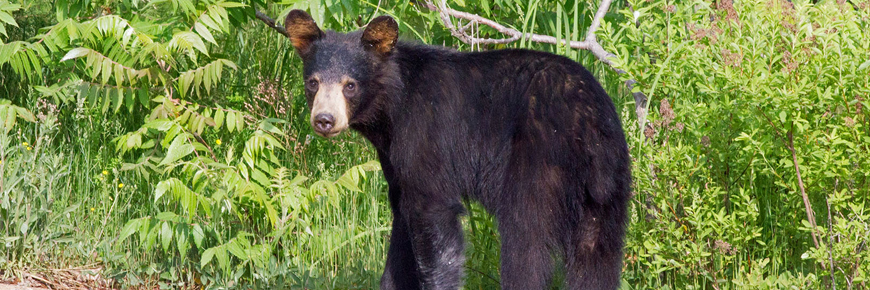
Wildlife safety
Georgian Bay Islands National Park
Keep the Wild in Wildlife
The chance to observe wild animals as they go about their natural lives is one of the most fascinating experiences that national parks have to offer. Along with this opportunity, however, comes the responsibility to treat wild animals with the respect they deserve, and need.

Eastern Massasauga Rattlesnake
The Eastern Massasauga Rattlesnake is a species at risk and Ontario's only venomous snake. The Massassauga is shy and non-aggressive by nature and is rarely seen in the wild due to its cryptic colouration and ability to camouflage. When feeling threatened the Massassauga will rattle its tail as a warning. If you have the chance to encounter one, it is best to give it space and leave it be.
Black Bears
Black bears visit the islands through the warmer months searching for food. Generally they prefer to avoid humans, although food left unsecured can attract them. Store your food and cooking supplies in the campground food lockers (where provided) or on your vessel. Please read You are in Black Bear Country for more information.

Poison Ivy
This plant can be found throughout the park, usually along trails and in disturbed areas like campgrounds and day use areas. Poison ivy can grow as low-lying ground cover or a small bush, and contact with the plant can result in a painful, itchy rash. Remember: "Leaves of three leave them be!"
Raccoons
Raccoons are opportunistic creatures when it comes to looking for and obtaining food. They are often referred to as the “masked bandits” of the campground. With their agile front paws they are very adept at opening containers, packages, coolers and even zippers on tents.

Lyme Disease
There is an increasing number of areas in Ontario where ticks carrying Lyme disease are found. These black-legged ticks (also known as deer ticks) attach to birds which migrate from place to place, bringing this health risk. While Lyme disease is easily treated when detected early, it can have serious and permanent health consequences if left untreated.
Going outdoors? Be tick smart.
For more information on Lyme disease, blacklegged ticks, and how to protect yourself from tick bites while enjoying the outdoors, please visit the following websites:
Public Health Agency of Canada: Lyme disease
Ontario Ministry of Health and Long-Term Care
Simcoe Muskoka District Health Unit
Tips for preventing negative encounters with wildlife:
- Keep campsites neat and clean.
- Keep food and all smelly products (i.e. toothpaste, soap, etc.) out of your tent. Store in a secure, animal-proof container or in the campground food lockers.
- Dishwater is an attractant for raccoons and bears and should be disposed of at the washrooms, not behind your campsite.
- When hiking, wear long sleeves, pants and hiking boots. Avoid wearing sandals or bare feet.
- DO NOT feed any wildlife.
Related links
- Date modified :